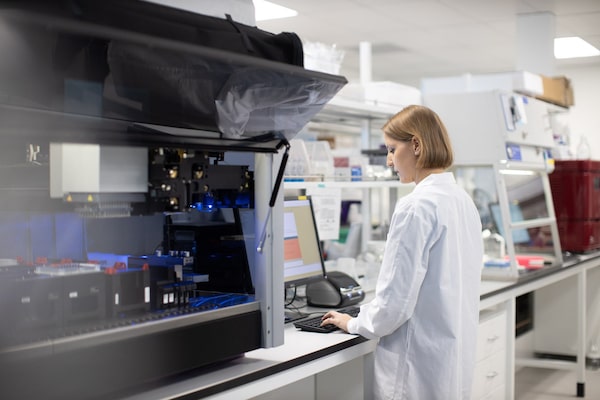
A scientist operates works at an AbCellera laboratory in this undated photo.AbCellera/Courtesy of manufacturer
A heavily funded Vancouver biotechnology startup whose work to find a treatment for COVID-19 has captured global attention says it could go public as early as this fall to capitalize on investor enthusiasm for health care stocks.
AbCellera Biologics Inc. is set to decide in the next two weeks whether to start a process that could see it go public between the Nov. 3 U.S. election and mid-December, chief executive officer Carl Hansen and chief financial officer Andrew Booth said in an interview.
The company – which uses a mix of complex technologies to unearth antibody-based drugs more quickly, cheaply and effectively than conventional methods – had originally planned on going public a year or two later, Dr. Hansen said. But it may start the process imminently on the advice of investment bankers who have pushed the company to take advantage of favourable market conditions for biotech initial public offerings (IPOs).
“It’s a watershed moment for biotech. It’s possible [AbCellera] could be ready in 2020, but that’s really a sprint,” Dr. Hansen said. “The key decision right now is, ‘Are we going to go in sprint mode or not?' We’re having a real discussion as to whether that is in the best long-term interests of the company.”
If the company decides to push for an IPO, it would hire underwriters in the coming weeks and make a final decision in mid-October whether to proceed, Mr. Booth said. If it doesn’t go this fall, an IPO would wait until 2021 – or later, as the company has the financial flexibility to wait, Dr. Hansen said.
An IPO by AbCellera would be the latest in a string of offerings by Canadian life-sciences developers, including cancer treatment developers Repare Therapeutics Inc. and Fusion Pharmaceuticals Inc., which each raised more than US$200-million in Nasdaq IPOs in June.
The domestic sector has performed well of late, reflecting strong market conditions in recent years for biotech companies globally. The sector has done particularly well during the pandemic as investors globally, spooked by market uncertainties in economically devastated industries, moved into a space specialized in finding lucrative new therapies, not just for COVID-19 but for a range of ailments including cancer.
New health and biotech issues accounted for almost half of the 141 IPOs in the United States in the past four quarters and 39 per cent of the US$38.2-billion raised, according to IPO tracker Renaissance Capital. The torrent of new offerings continued with four biotechs going public in the U.S. last week alone, raising more than US$770-million combined in well-received deals. In late June, Renaissance said U.S. biotech IPOs this year had generated an average 80-per-cent return over their issue price.
AbCellera has already raised significant sums in 2020 on the strength of numerous partnerships with some of the world’s largest drug companies to identify drug candidates for a range of ailments, including a deal with Eli Lilly and Co. to develop a treatment for the novel coronavirus.
In May, AbCellera secured $175.6-million in development funds from the Canadian government plus US$105-million in venture capital from leading global life-sciences investors. The 164-person company has more than doubled revenue in each of the past five years and is believed to generate about US$30-million a year in sales.
AbCellera spun out from the University of British Columbia’s interdisciplinary Michael Smith Laboratories – where Dr. Hansen ran the bioengineering group – in 2012. Using technology developed at the lab, AbCellera speeds up the process to isolate and identify antibodies created by humans to fight infections.
Its “antibody discovery engine” process involves passing blood samples from a person who has developed an immunity to a disease through a credit card-sized “microfluidic” device with hundreds of thousands of tiny chambers. Using artificial intelligence, it tests antibodies produced by cells in each chamber simultaneously to hone in on which have the potential to be developed into drugs.
Within three days of receiving a blood sample from a recovered COVID-19 patient this spring, AbCellera isolated hundreds of antibody candidates for a drug. It cut that to 24 within three weeks and partnered with Eli Lilly to put a drug into accelerated human trials. Those are under way and expected to yield efficacy results this year, around the time AbCellera could go public.
Dion Madsen, partner with Canadian biotech venture capital firm Amplitude Venture Capital, said AbCellera would likely be successful if it goes public under current market conditions. “I think there would be a lot of excitement” about its technology, he said. “This is a company that has a robust pipeline of partnerships that provides a steady revenue stream and the potential of significant future royalties.”